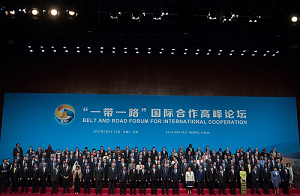The Chinese One Belt One Road Initiative Could be Doomed without Market Reforms
By Najia Badykova
June 27, 2017, the CACI Analyst
In May, Beijing hosted a summit of global leaders on its One Belt and One Road (OBOR) initiative, a most ambitious project aimed to recreate the ancient Silk Road, connecting China’s industrial heartland to Europe via Central Asia and the Middle East. Given the gigantic scale of the scheme, the geostrategic and economic impact on Central Asian trade and development will be significant. Yet it is unlikely to benefit everyone equally. The less developed and poorer countries along the proposed routes, including those in Central Asia, will face serious challenges if they assume that this initiative alone can fix their economic problems, and use it as an excuse to further delay needed market reforms while coping with the effects of the massive Chinese initiative.

TAPI gas pipeline: are Sino-U.S. relations a zero-sum game?
By Rohullah Osmani
January 21st, 2016, The CACI Analyst
The groundbreaking ceremony of the US$10 billion natural gas pipeline project linking Turkmenistan, Afghanistan, Pakistan, and India (TAPI) took place in Ashgabat, Turkmenistan on December 13, 2015, with the Afghan President, India’s Vice-President and Pakistani Prime Minister in attendance. The breakthrough on the long-delayed TAPI gas pipeline project came when the 22nd TAPI Steering Committee, consisting of representatives of the participating countries, as well as the Asian Development Bank (ADB) as the acting transactional advisor for the project, approved Turkmenistan’s state-owned Turkmengaz as the consortium leader to oversee efforts in constructing, financing and operating the 1,000 mile long natural gas pipeline.
Kazakhstan's revival of the Silk Road Initiative: the challenges ahead
By Rafis Abazov
October 8th, 2015, The CACI Analyst
During his recent visit to China, Kazakhstan’s President Nursultan Nazarbayev signed a series of trade agreements and Memorandums of Understanding (MOUs) on 48 projects valued at about US$ 30 billion. The Minister of Economic Affairs, Yerbolat Dosayev, has called the Chinese market one of the “main markets for Kazakhstan.” The Kazakh government also reiterated its support for the Beijing-instigated “Silk Road Economic Belt (SREB)” initiative and agreed to continue working on several large infrastructure projects. But opinions of Kazakh experts on the SREB are divided. Some believe China’s financial backing will strengthen trade and lead to economic growth, but others are skeptical, claiming it would conflict with the U.S.´s “New Silk Road” initiative.





